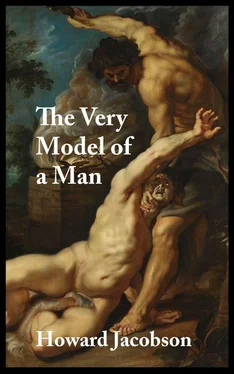And so it was with the new friendship between my father and me. We made no arrangements and did not allude to causes, but every morning, after we had hacked our separate ways through whatever murderous thicket had multiplied itself while we slept, we met, as if by accident, at the foot of a bare granite pinnacle whose ascent was attended with many difficulties but whose summit, once attained, gave us respite from the sloshings of my mother’s milk, and a sort of deliverance, an illusion of freedom from all things fructifying and earthy.
Nothing lives here, I said, during our inaugural climb, unable to keep the exultation out of my voice.
My father’s eyes met mine. Little fires danced in his pupils. And nothing ever will, he exulted back.
Nothing lived there. Nothing could live there. No sap rose; no spongy breeding soil yielded to our tread; nothing stirred or whispered from the depths, because there were no depths — only rock supporting rock. We walked on stone, mounting higher and still higher until we stood among the clouds like angels, pure intelligential substances who were thus far and no further corporal: we loved to breathe in thin air and feel flint, uncreated and uncreating, beneath our feet.
At first, lizards, geckos, salamanders — frogs ambitious to resemble alligators — would follow our ascent, looking lidlessly at us, estimating how much of a gulp it would take to pass us through their gullets; but we became so adept at stoning them — my father, especially, throwing with great accuracy and malice, as though he owed them an injury — that soon we had the entire tumble of silent boulders to ourselves. Once in a while, in order to draw breath against the fierce heat the sun slung down at them, the rocks would spit and explode, leaving a rip like a frightened mouth to deface their impassivity. But no eager organism sprang fully formed from the scissure, as happened down below; no hippogriff or amphisbaena groaned itself into being in the breach, sniffing the air and rubbing clay from its burning eye, both front and rear.
We barely spoke. Discussion distressed my father. He believed it disadvantaged him. On the few occasions he did bring up the subject of his God-inveigled wife, islanded in her marsh of sacred pollutions, he referred to her as your mother, as though she were my fault, and quickly became too uncomfortable to proceed. In the matter of possessive priorities we were without guidance; we none of us knew whose, first and foremost, any of us were. And in the matter of her physiology he was, anyway, more reserved, which is to say at once more delicate and less fastidious, than the Deity whose invention that physiology was. Rivers of unclean blood did not course through his conversation. Uncovered fountains did not spray their infection on his thoughts. Neither her body nor his own served him as a storehouse of invective. This had to do partly, I freely grant, with the poverty of his vocabulary. You have to be verbal to be disgusted. But it is not utterly out of the question that he kept himself short of words precisely in order not to give offence. Words are power, and power has no truck with sensibilities.
Anyhow, he would say, as though someone had to bring this interminable conversation to an end, we haven’t come up here to discuss your mother. And he would at once engross himself in his hands, which were the size of pole-axes, which had been given him so that he might tear down trees and smite wild animals, but which he wished to employ only as instruments of innocent subterfuge, and therefore, by implication, as proofs of his essential probity.
Behold! Empty! An honest man!
God is not here, I said to him once, after I had caught him in an attitude suspiciously like that of supplication, attempting to separate his tuber-like fingers in the sight of heaven. God is not on this mountain, I promised him. He is not watching. As we both very well know, He is with my mother, talking plenitude and foison. So there isn’t any use in your showing Him how clean your palms are.
He followed me through some of this, moving his lips in accompaniment to my words. But I lost him before I’d finished. As usual, my fluency startled him, pleased him and bored him, all at once. He allowed a decent interval of speechlessness to elapse before showing me that he held a large bay leaf between his thumb and first finger, and that he intended to do something surprising with it. You’ll like this, he said.
There was no basis for that presumption. I had never liked anything he did with his hands. But I was more concerned with where he had found the leaf. I hope you didn’t get that round here, I said.
From the look he threw me you would have thought our roles had suddenly been reversed, and I was the slow one. Round here? Had I forgotten that nothing grew round here? Had I forgotten that that was why we came here?
I eyed him suspiciously. I might not have believed in his magic, but I was still too young to believe completely in my disbelief. What if, after all, he could make the barren rocks bloom? Strike vegetation out of stone?
So where did you get it?
He inverted the thumb that wasn’t busy with the leaf. It was a sign we both used to designate, with a minimum of reference, the place we fled from: the fertile valley, our teeming cradle, omphalos, hell, home.
You brought it up here with you?
I’ve been bringing it to practise with, he said, for days. It shows how little you notice. Are you ready now?
You aren’t going to turn it back into a tree?
He laughed. The thing he did best. Good humour spilling like gum arabic down his chest. I’m not as good as that… yet. What I am going to do, though, is turn it back into air. Are you ready?
I said that if he was going to turn it back into air I was certainly ready.
He cleared his throat. He always had to begin from the beginning. In the beginning… He required silence and attention, formlessness and void, to remember how it all went… is the leaf. You may check it if you wish. Satisfied? Good. Now watch carefully. Let there be…
He made an abrupt downward movement of the hand, as if trying to throw off something that was sticking to it, followed by a still more abrupt upward movement, as if something else were sticking to it even harder.
. . AIR!
And so it came to pass. And it was good.
He showed me his palm, held open in the shape he made shadows and reflections of animals with on rock and water. Empty. Then, without altering its profile, he showed me the back of his hand. Empty also. Or at least emptyish. Empty if you discount the green fibres that were just visible between his fingers.
Well? He was impatient for my verdict. Well?
I nodded. Miser that I was.
Effective?
Very effective.
I did not add that if he meant to unmake creation, a leaf at a time would be slow going.
He insisted on explaining how it was done. Ungodlike of him.
The leaf is held between the thumb and the first finger. The thumb relaxes — that’s important — allowing the leaf to droop against the backs of the first, second and third fingers. The little finger grips the edge of the leaf between itself and the third finger; the first finger falls away so that the thumb is now gripping the opposite edge of the leaf between itself and the second finger. Now, how does it go?… Yes… the first finger slips down the edge of the leaf and replaces the thumb in gripping the edge of the leaf against the… which is it?… the third, no, the second finger… the second finger, that’s right… which permits the thumb to move away, leaving the leaf firmly gripped, like… like… so, between the first and the second, and the little and the third. Extend and straighten the fingers and, watch! — are you watching this? — the palm of the hand is empty! Now, in order to transfer the leaf from the back of the hand to the front, close the fingers of the palm, grip the…
Читать дальше











